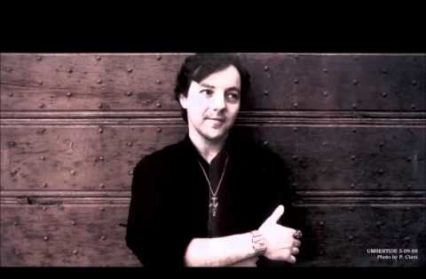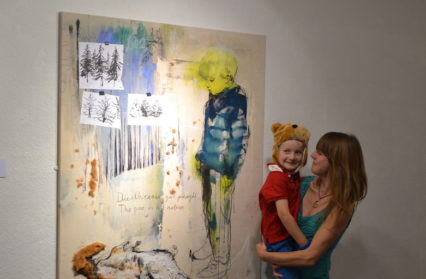November’s Artist in Residence David Roche talks to author, musician and collaborator Paul Roland. Throughout 2017 these artists, including David Roche will take a leading creative role in what Wales Arts Review publishes, centring their skills on a challenging project over the course of a month. We were inundated with applications, receiving hundreds of emails about the positions, and it was no easy task whittling down all that talent to this final eleven. Our team of six editors debated long into the night, and in the end, we decided on a collection of people who we most want to work with, and whose work excites us. We think you will be excited by them too.
David Roche and Paul Roland | A.i.R: A Conversation With…

This is my last week as Artist in Residence with Wales Arts Review – unbelievable! Keen readers may have noticed that I haven’t been posting much over the last 10 days and although this is the case I can assure you that I haven’t been idle. This article is the first of three that I will be produced prior to the end of my post and I’ve spent the last week or so hunting for special things to put into my upcoming articles… and I hope they materialize in time. Either way, let’s get to it.
In this article, I will discuss my work with the author, songwriter, and composer Paul Roland. I have recently finished transcribing, arranging (in parts), and editing his 30 minute-long Grimm Fantasy for orchestra which will be performed and recorded later this year. This was a huge and ambitious project for both of us and Paul has very kindly contributed to this article. My hope is that you’ll get some insight into the creative processes we each had to undertake to make this music work.
For those of you who don’t know Paul Roland’s music you should definitely check out Duel, which is one of his most famous albums, and ‘Wyndham Hill’, which is my favourite of his tracks. He is also a cracking author and I recommend that you take the time to read some of his works. I’ll stop typing and let him speak for himself:
I [Paul Roland] am a semi-professional songwriter with a decent-sized cult following in Europe and a reputation for creating macabre and fanciful Victorian-themed lyrics. I have been called the godfather of steampunk and the Edgar Allen Poe of Psych-Pop.
Thank you, Paul. But how and why did we end up working together?
In 2016 I was looking for a composition teacher after having been invited to write a 30 minute orchestral piece for an Italian chamber orchestra. The ensemble in question had acquired a name for performing and recording ‘difficult’ contemporary pieces, including one that they had commissioned from the late avant-garde rock musician Frank Zappa. They were now looking to collaborate with other rock musicians, but as the ensemble comprises members of the La Scala orchestra and also the Berlin Philharmonic I was concerned that my music should be worthy of them.
The problem was that I was an intuitive, self-taught songwriter with 40 years writing and studio experience but no grasp of the basic grammar of music. To be brutally honest, I couldn’t read or write music, but had an innate sense of melody and harmony which was enough to enable me to write songs, though I’d always had to rely on a classically trained arranger to score the parts for strings and woodwind when recording my more intimate ‘chamber’ songs. For the past few years, however, I had been creating the parts for other instruments by playing them on a keyboard, so I was confident that I had an instinctive grasp of counterpoint and harmony. Taking these mini orchestrations to the next level would therefore not be unfeasible – at least in theory.
The result of the invitation to Paul was a 30-minute orchestral piece. Paul had spent a considerable but impressively short amount of time writing and recording this piece of music at his keyboard. I offered to work towards producing a transcription of this piece and with his agreement, we started working towards producing a score.
The process of transcription was pretty exhausting. Paul says that he was ‘composing short, melodic lines and keeping the orchestration sparse and simple’ but things certainly became harmonically and contrapuntally dense. The most difficult task as far as transcription is concerned relates to choral music. This was Paul’s most chromatic writing and it took a huge amount of time to work it out, I ended up devoting a few sessions to these parts and coming back to them after working my way further into the piece. In a piece of this size, it’s easy to get lost and demotivated – one has to keep going. Generally speaking, however, my process was to divide the work into chunks and chip away it week by week.
The whole, the gargantuan process was made significantly easier by engaging with the interest one can find in following and anticipating a composition. By the time I reached the last 10 minutes of Grimm Fantasy, I was able to make guesses at what pitches Paul would play based on what he had shown to be the reach and favoured movements of his hands (remember that he composes at the keyboard – as do I). It’s also fun when someone doesn’t follow a pattern that you expect them to, and this is absolutely the case with Grimm Fantasy. There were plenty of unusual and exciting structural events that tweaked my ears as a composer!
Another substantial task was finding a middle ground between using the full orchestra and maintaining Paul’s lightly-scored musical ideas. Large sections of this work make use of quartet and quintets and I thought it might be handy to frame these with larger, tutti sections. My role in this regard was to occasionally arrange sections in a manner that developed the material that was already there; bulking up gestures here and there, very occasionally filling out some of the harmonies, and teasing out the odd contrapuntal line. Paul Roland was always clear about what he wanted for the piece: ‘I didn’t want to lose that sparseness and fairytale-like simplicity that was appropriate for the subject so I kept to […] just a few shadings where it significantly added to the atmosphere or the drama’.
Towards the end of the process, we spent a long session working through the whole score ensuring that every element was just so. It was also a useful opportunity to explain what aspects of the writing presented on the recording had to be altered during the process of creating a performable score. These were usually simple technical things like ensuring the music could be played on the instrument for which it was scored, making sure solo instruments would be audible over other groups of performers, and making suggestions – which Paul would decide upon – about the density of orchestration and harmony.
This is definitely one of the most interesting projects I’ve been part of. There was huge flexibility in terms of my role as transcriber, orchestrator, arranger, and composer. Paul thinks about music in a totally different manner and his compositional choices led him to unusual places, particularly in terms of structure. Grimm Fantasy is unified but cast in a shape different to other orchestral music and this has certainly influenced my own writing.
I am really excited to hear this work performed. The whole project seemed terrifying and gigantic but, as Paul says: ‘sometimes you have to seize the opportunity to develop even if it is intimidating. Until you venture into those dark forests of the mind you will never know what awaits you on the other side.’ I’m certainly looking to working on more projects with Paul over the coming years!
This piece about Paul Roland by David Roche is part of the Artists in Residence series.











